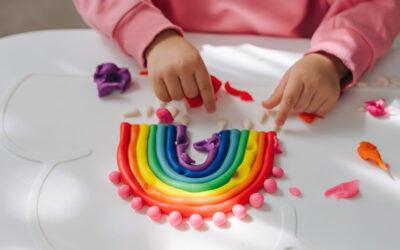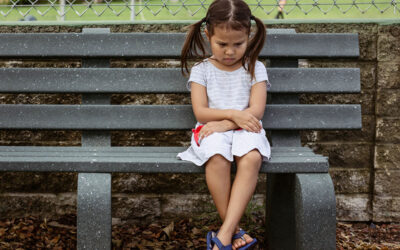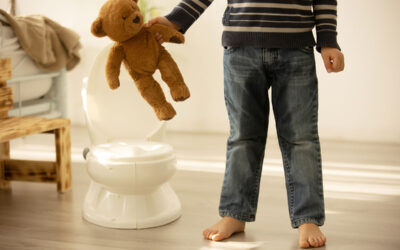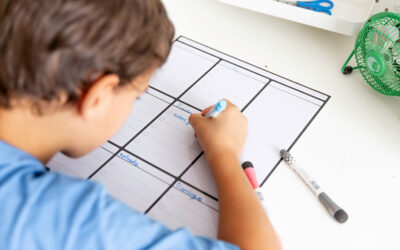Articles
Healing from Trauma/Neglect/Abuse
5 Ways to Help a Child with Sensory Challenges
Many of the grandchildren, nieces, nephews, and other kids you care for have been through hard things, such as neglect, abuse, loss, or exposure to alcohol or drugs before birth. These early experiences can shape how a child’s brain and body respond to the world...
Do You Need Help with Your Relative Child’s Tantrums, Rages, and Meltdowns?
Does this sound familiar? Your grandchild starts yelling, crying, or storming off in the middle of the grocery store. Your heart starts racing, and you feel like all eyes are on you! Do you need better tools to handle your grandchild's or other relative child’s...
Fun Ways to Create a Secure Attachment with Young Relative Children
While raising this young toddler or school-aged child in your home, you have a special opportunity to help them feel safe, loved, and strong. One of the best gifts you can give them is a secure attachment. This bond tells your grandchild (or nephew or cousin): “You...
Impacts of Prenatal Exposure to Alcohol and Drugs
Maintaining a Relationship with Your Relative Child’s Parents
When a parent struggles with substance use, it can shake the whole family. Often, grandparents, aunts, or uncles step in to raise the child. This is a loving and brave choice, but it is also painful. You may feel sadness, anger, or guilt as you take on this role. You...
Strengths Before Struggles: A New Way to See Your Child or Youth
When a child has lived through tough times, like trauma, neglect, or abuse, the adults in their life often focus on what’s “wrong” and try to fix it. We invite you to consider that there is another way to tackle the challenges and the impacts they have on your...
Bedwetting and Accidents, Potty Training Part 2
Helping a Child with Bedwetting and Other Toileting Problems Even after a child has learned successful daytime potty skills, they may experience other toileting challenges. For example, overnight bedwetting or pooping in their pants is not uncommon for kids who were...
Challenging Behaviors
Handling the Holidays When Life Feels Overwhelming
If it feels like the kids start acting up the minute the decorations go up—you're not imagining it. The holidays can bring out big emotions in everyone, especially children who’ve been through hard times. Whether you’re raising your grandchild, niece, nephew, or...
Do You Need Help with Your Relative Child’s Tantrums, Rages, and Meltdowns?
Does this sound familiar? Your grandchild starts yelling, crying, or storming off in the middle of the grocery store. Your heart starts racing, and you feel like all eyes are on you! Do you need better tools to handle your grandchild's or other relative child’s...
When Siblings Harm Each Other
In this community, we value “family” as much bigger than just parents and children. This is one of the most common reasons that grandparents, aunts, uncles, and other relatives step in to help raise a child when the parents can’t. The strength of kinship care helps...
ADHD
Helping Your Grandchild with ADHD Succeed at Home
Raising a child with attention deficit hyperactivity disorder (ADHD) can be challenging, but with the right strategies and support, you can help your grandchild (or niece, nephew, or other relative) manage responsibilities at home effectively. These practical tips can...
How to Support a Child with Executive Function Delays
You may hear from your grandchild's teacher or your nephew's pediatrician about their "executive function skills," you might wonder, "What exactly does that mean?" Executive function is the set of neurological processes that helps us organize and supervise our...
Raising Capable Kids
Raising a child with ADHD, autism, or other neurodiversity can be a new challenge for many grandparents, aunts, or uncles who don't understand the child's diagnosis. However, whether this child has a diagnosis, disability, or other brain-based difference, it’s...
Disrupting Birth Order
No Results Found
The page you requested could not be found. Try refining your search, or use the navigation above to locate the post.
Helping A Child Heal from Sexual Abuse
Helping a Child Cope with the Impacts of Sexual Abuse
When a child is sexually abused or assaulted, one of the most damaging impacts of that traumatic experience is shame. The weight of shame and self-blame can lead to years of negative self-talk, depression, anxiety, self-esteem struggles, and more. These impacts make...
3 Ways to Help a Child Heal from Sexual Abuse
It is painful to consider that your grandchild (niece, cousin, or friend) was sexually abused. You might fear the path ahead and worry if they will ever overcome the pain and stigma of the abuse. The good news is that kids can and do heal from this type of abuse if...
School Issues for Foster & Kinship Kids
What Do I Do? My Grandchild Refuses to Go To School Every Morning!
What is School Refusal? Many kids will complain about headaches or stomach-aches to try and stay home from school and watch cartoons. You might have even faked a tummy ache as a child to spend the day at home! When a child is trying to avoid a one-time event like a...
Finishing the School Year Strong
As the school year winds down, it's easy for kids to check out from their school routines. Spring breezes tempt them, and there's nothing quite as enticing as hours of outdoor time with friends. Keeping your grandchild, niece, or cousin engaged and current with...
When a Student Refuses to Comply with School Supports – Part 2
When a child has learning challenges, they may receive special support and services through an IEP (individualized educational plan) or 505 plan. These accommodations and resources are unique to this child's learning style or struggles. They can be a combination of...
Technology/Internet and Our Kids
Teaching Kids to Protect Themselves Online and on Social Media
Your grandchildren are growing up in an era unlike any you’ve witnessed before. Technology is as familiar to them as breathing – they’ve never known a time when tablets, iPads, phones, and laptops were not accessible every day. Schools have come to rely heavily upon...
13 Common-Sense Rules for Internet Use in Your Home
The internet is a fantastic tool for research, entertainment, and connection. Children are getting phones, laptops, and tablets at younger and younger ages. The ease of access to the internet, literally in our back pockets, can make parts of our lives incredibly easy...
Tips for Safe Technology and Internet Use for Tweens and Teens
Are you raising a grandchild (or nephew or cousin) who spends countless hours scrolling on their phone? Do you know what they’re doing on their tablets, laptops, or cell phones? How do we navigate the issues of internet safety, social media culture, and screen time...
Self-Care for Kinship and Foster Parents
Keeping a Strong, Supportive Mindset When Raising Your Tween or Teen Relative
As a grandparent, aunt, or other relative raising a tween or teen, your mindset matters more than you may ever realize. You are not just their caregiver — you are also a role model. Your inner attitude influences how well this young person grows into a confident,...
Taking Care of Your Grandchild’s Mental and Emotional Wellbeing
Raising your grandchild, niece, nephew, or other young relative can be a blessing. However, it can also be challenging to navigate. When a child lives apart from their parent—especially due to addiction or substance use—it can create deep emotional stress for everyone...
Tips to Help You Plan Regular Self-Care
Raising your relative’s child is a sacred responsibility and a loving act that gives this child a safe space to land when their parents cannot care for them right now. Whether you're a grandparent, aunt, uncle, cousin, or chosen family, you can make a lasting impact...
Relationship with Child’s Parent
Working with Your Grandchild’s Parents is Good for All of You!
Welcoming a grandchild, nephew, or cousin to your home while their parents seek treatment or get back on their feet can be a rewarding and fulfilling experience. After all, you are giving this child a safe space to land when their parents need time to get back on...
Supporting Your Grandchild’s Parents to Succeed
Helping raise your grandchild, nephew, or other relative gives you a unique opportunity to offer nurture and support to the child's parents. The parents may feel shame or guilt about not being able to parent this child. And it's not unusual for your pre-existing...
Tips for Maintaining Relationships with Parents Who Struggle with Substance Abuse
Many grandparents or aunts are raising their grandchild or nephew because the child’s parents are addicted. It is easy and very tempting to judge the child's parents as bad and irresponsible. While you love them, you may be angry at them for putting you in this...
Working Together For the Good of the Child In Your Care
Taking Care of Your Grandchild’s Mental and Emotional Wellbeing
Raising your grandchild, niece, nephew, or other young relative can be a blessing. However, it can also be challenging to navigate. When a child lives apart from their parent—especially due to addiction or substance use—it can create deep emotional stress for everyone...
Keeping Tweens and Teens Busy During Summer Break
Most kids look forward to summer break. The school year is over, the days are long, and there's more time to relax, be outside, and have fun. But after a while, you will likely hear “I’m so bored” or see signs of their restlessness. Many kids who have experienced...
When Your Relative Child’s Parents Struggle with Addiction, Mental Health, or Intellectual Disabilities
Raising a relative child is likely not something you planned for this stage of your life. Your relatives (adult children, cousins, siblings) struggle to manage parenting independently, and stepping in to support them feels like the right thing for everyone who loves...
Raising Adolescents (tweens/teens)
Preparing Your Relative Youth for Adulthood: Learning Work and Life Skills
When your grandchild or another young relative says they don’t want to go to college, you might feel a mix of emotions, such as worry, confusion, sadness, or even relief. Whatever you think, it’s okay. You’ve already carried a big load helping them get this far. Their...
Preparing Your Relative Youth for Adulthood: College or Vocational School
When your grandchild or another young relative starts talking about life after high school, it can feel both exciting and overwhelming. You’ve already helped them through so much, like school projects, doctor visits, hard days, and big dreams. Now it’s time to help...
Fun Ways to Create a Secure Attachment with Your Relative Tween or Teen
When you’re raising a grandchild, niece, nephew, or another relative who’s already in their tween or teen years, you might wonder if it’s too late to build a secure attachment. The good news? It’s never too late. While attachment with younger children often comes...
Supporting Healthy Relationships/Attachment
Why Friendships Matter – Part 1
Friendships are more than just fun — they help children learn essential skills that last a lifetime. Through friendships, children learn how to share, show kindness, understand other people’s feelings, solve problems together, and feel accepted and cared for. As a...
Tips for Welcoming a Tween or Teen Relative to Your Home
When your tween or teen relative can no longer live safely with their parents, moving to a relative’s home can bring many mixed feelings. They may feel relief, fear, anger, or guilt. The feelings are mixed for you, too: uncertainty, hope, or even overwhelm. All of...
How to Talk to Teens About Screens
When you’re raising a relative’s teen in your home, especially when that teen couldn’t live safely in their parents’ home, you may face unique challenges. One of the big ones today is screens: phones, tablets, gaming, social media. It can feel like you’re fighting a...
Phone
This website was supported with funding from the U.S. Department of Health and Human Services, Administration for Children and Families’ Children’s Bureau through the Improving Child Welfare Through Investing in Family grant #HHS-2021-ACF-ACYF-CW-1921. The purpose of this grant is to provide an array of kinship preparation services and ongoing kinship supports, and provide shared parenting to build trusting relationships between all out-of-home caregivers and parents of children/youth in foster care to ensure parents and families remain actively involved in normal child-rearing activities.
This website is supported by Grant Number 90CW1149 (HHS-2021-ACF-ACYF-CW-1921) from the Children’s Bureau within the Administration for Children and Families, a division of the U.S. Department of Health and Human Services. Neither the Administration for Children and Families nor any of its components operate, control, are responsible for, or necessarily endorse this website (including, without limitation, its content, technical infrastructure, and policies, and any services or tools provided). The opinions, findings, conclusions, and recommendations expressed are those of the author(s) and do not necessarily reflect the views of the Administration for Children and Families and the Children’s Bureau.

































